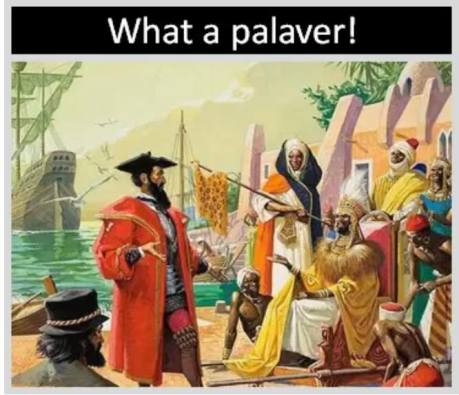One of the unsettling things about getting old is that I find myself using antiquated expressions that I always disdained, such as
“Well, this is a bit of a palaver…”
With that classic understatement of the English, the ideal context is when serious calamity strikes, such as when quelling a mutiny of the restless natives [As one does—Ed.]. Sure enough (cf. Tickety-boo), its etymology goes back to colonialism. Used in English since the early 18th century,
palaver, “profuse and idle talk; chatter”, comes from Portuguese palavra “word, talk, speech” by way of sailors’ slang. Portuguese was commonly used as a trading language on the West African coast, and palaver came into English first in the sense “a parley or conference, typically between Europeans and the Indigenous people of a region, especially in West Africa”.
One gathers that such discussions were not entirely on equal terms… The same source goes on:
Portuguese palavra and its Castilian counterpart palabra come from Latin parabola “comparison, explanatory illustration”, and in Late Latin (and especially in Christian Latin), “allegorical story, parable, proverb”.
And it elaborates on a widespread phenomenon:
Metathesis, the transposition of consonants, is common in Spanish and Portuguese: the syncopated form parabla (from parabola) becomes palavra in Portuguese and palabra in Spanish, just as Latin mirāculum “miracle” becomes milagro in Spanish and milagre in Portuguese.
The wiki entry on metathesis gives instances from a wide range of languages including Amharic, Azerbaijani, Kurdish, Finnish, Hungarian, Navajo, Turkish—and English.
It’s just as mystifying to suddenly hear oneself using the word kerfuffle,
early 19th century: perhaps from Scots curfuffle (probably from Scottish Gaelic car “twist, bend” + imitative Scots fuffle “to disorder”), or related to Irish cior thual “confusion, disorder”.
Like Ogonek and Til, Palaver and Kerfuffle could be another “feisty yet flawed” pair of detectives.
I can’t see that kerfuffle is related to faff, another word I’ve weirdly adopted—not so much in the sense of “faffing around” as in “this is a bit of a faff”. Again, its etymology is interesting:
late 18th century (originally dialect in the sense “blow in puffs”, describing the wind): imitative. The current sense may have been influenced by dialect faffle “stammer, stutter”, later “flap in the wind”, which came to mean “fuss, dither” at about the same time as faff (late 19th century).
The stammering connection may now establish “faff” even more f-f-firmly in my vocabulary. I surmise that the emergence of such words denotes the transition from an adventurous, carefree youth to the desire for a tranquil life unruffled (unfaffled?) by the sundry ordeals of old age (passwords, call centres, stairs…).
So now we have Palaver, Kerfuffle, and Faff—a firm of solicitors. Colloquially abbreviated to Falafel.
* * *
For the “exploits” of early colonialists, see Vermeer’s hat; do read Sitting Bull’s rebuke to the invaders in n. 1 of The Ghost Dance; and for more dabblings in Portuguese, click here. I am now in the habit of referring to “hideous encounters with domestic necessity” as “marmalade”, after Compton Mackenzie’s beautiful talk about his meeting with Henry James.

